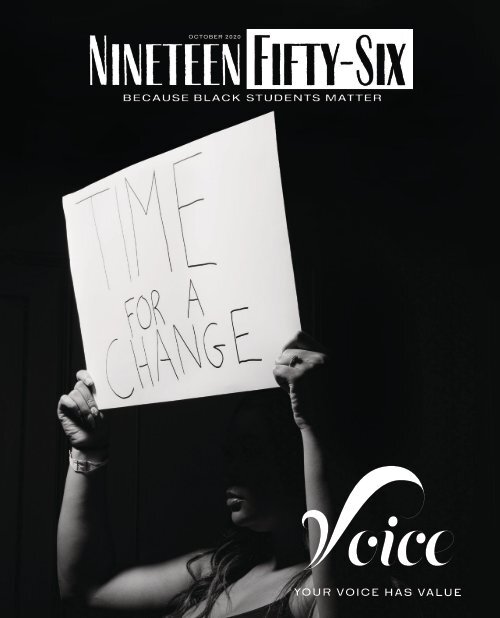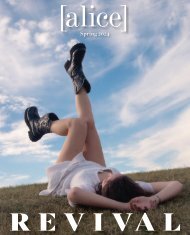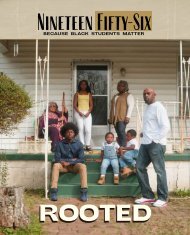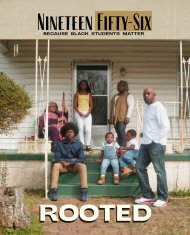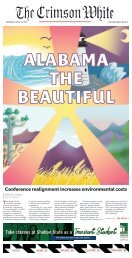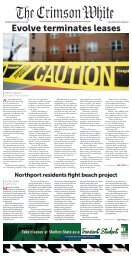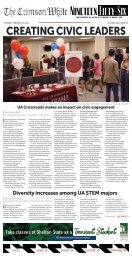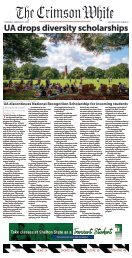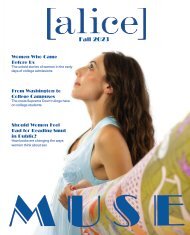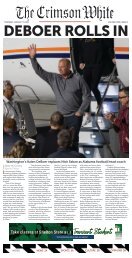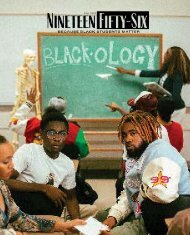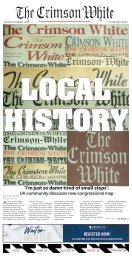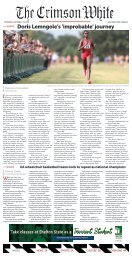Nineteen Fifty-Six Vol. 1 No. 2 Voice
This is the October issue of Nineteen Fifty-Six magazine. The theme, Voice: Your Voice has Value, is especially important in the weeks leading up to the presidential election.
This is the October issue of Nineteen Fifty-Six magazine. The theme, Voice: Your Voice has Value, is especially important in the weeks leading up to the presidential election.
Create successful ePaper yourself
Turn your PDF publications into a flip-book with our unique Google optimized e-Paper software.
OCTOBER 2020<br />
<strong>Voice</strong><br />
YOUR VOICE HAS VALUE
1
You do matter. The numerous achievements<br />
and talents of Black students deserve<br />
to be recognized. As of Fall 2019, 10.50%<br />
of students on campus identified as Black<br />
or African American. Black students are<br />
disproportionately underrepresented in<br />
various areas on campus. <strong>Nineteen</strong> <strong>Fifty</strong>-<br />
<strong>Six</strong> is a Black student-led magazine that<br />
amplifies the voices within the University<br />
of Alabama’s Black community. It also seeks<br />
to educate students from all backgrounds<br />
on culturally-important issues and topics<br />
in an effort to produce socially-conscious,<br />
ethical and well-rounded citizens.<br />
2
EDITORIAL STAFF<br />
EDITOR-IN-CHIEF<br />
MANAGING EDITOR<br />
VISUALS EDITOR<br />
ASSISTANT VISUALS EDITOR<br />
PHOTO EDITOR<br />
ASSISTANT PHOTO EDITOR<br />
CULTURE AND LIFESTYLE EDITOR<br />
ASSISTANT CULTURE AND LIFESTYLE EDITOR<br />
FEATURES AND EXPERIENCES EDITOR<br />
ASSISTANT FEATURES AND EXPERIENCES EDITOR<br />
ENGAGEMENT EDITOR<br />
ASSISTANT ENGAGEMENT EDITOR<br />
FACULTY ADVISOR<br />
ASSISTANT ADVERTISING DIRECTOR<br />
DIGITAL MEDIA MANAGER<br />
TIONNA TAITE<br />
BHAVANA RHAVALA<br />
A’NESHIA TURNER<br />
ASHTON JAH<br />
ZAHREA SMALL<br />
ALEXIS BLUE<br />
FARRAH SANDERS<br />
REENA MILLER<br />
HALEY WILSON<br />
SALA BANDELE-JACKSON<br />
NICKELL GRANT<br />
TAYLOR GARNER<br />
MONIQUE FIELDS<br />
JULIE SALTER<br />
TERRY SIGGERS<br />
CONTRIBUTORS<br />
JAVON WILLIAMS, TA’KYLA BATES, RACHEL PARKER,<br />
JEFFREY KELLY, DE’YONICA DANIELS, JASMINE HOLLIE,<br />
JOSEPH KING, KENYA HARRIS, KIERRA THOMAS<br />
WRITERS<br />
MADISON CARMOUCHE, DONOVAN HARRIS, YOSMEN FOSTER,<br />
TAZARI WOODMORE, CAMERON URQUHART,<br />
AMBER EVANS, LEAH MCGRUDER<br />
PHOTOGRAPHERS<br />
ARMYLL SMITH, ASIA ANDERSON, BREONA WINN,<br />
CASSIDY BURRELL, GABBY ADAMS, KARRIS HARMON,<br />
KENDE’LYN THOMPSON, MADISON DAVIS,<br />
MALLORY WESTRY, MA’KIA MOULTON, NIA ANDERSON, TYALA<br />
BONNER, JOLENCIA JONES, KAELA ROBINSON<br />
ENGAGEMENT<br />
MARKETERS AND<br />
STRATEGISTS<br />
ADDITIONAL INFO<br />
3<br />
<strong>Nineteen</strong> <strong>Fifty</strong>-<strong>Six</strong> is published by<br />
the Office of Student Media at The<br />
University of Alabama. All content<br />
and design are produced by students<br />
in consultation with professional<br />
staff advisers. All material contained<br />
herein, except advertising or where<br />
indicated otherwise, is copyrighted ©<br />
2020 by <strong>Nineteen</strong> <strong>Fifty</strong>-<strong>Six</strong> magazine.<br />
Material herein may not<br />
be reprinted without<br />
the expressed, written<br />
permission of <strong>Nineteen</strong><br />
<strong>Fifty</strong>-<strong>Six</strong> magazine.<br />
Editorial and Advertising<br />
offices for <strong>Nineteen</strong> <strong>Fifty</strong>-<br />
<strong>Six</strong> Magazine are located<br />
at 414 Campus Drive East,<br />
Tuscaloosa, AL 35487. The<br />
mailing address is P.O.<br />
Box 870170, Tuscaloosa,<br />
AL 35487. Phone: (205)<br />
348-7257.
Change is defined as something that produces a<br />
different position, course, or direction. In the weeks<br />
leading up to the presidential election, I felt it was<br />
necessary that this magazine issue focuses not only<br />
on Black voices but also the change that can result<br />
from our voices.<br />
Over the past few months, voting has been<br />
emphasized more than ever. I agree that everyone<br />
who can vote should. This ensures every group<br />
regardless of race or background is represented and<br />
their voice is heard in the election. I also want to<br />
acknowledge the young activists who may not be of<br />
voting age. Their voices still matter and they also<br />
have a lot to say. My two younger brothers display<br />
their desire to enact change by using their voice.<br />
Neither one of them are of voting age. However, they<br />
still do their part in using their voice for change<br />
by learning about Black history and the current<br />
racial injustices we still face today and sharing it<br />
with their peers. In this way, they too can play a role<br />
in advocating for a future where racial injustices<br />
do not persist. I encourage you to also look at the<br />
younger people in your life and help them use their<br />
voice for change because regardless of age Black<br />
voices matter.<br />
Using your voice does not always come in the form<br />
of vocalization. Writing is an effective way to be<br />
heard without enunciating one word. In fact, I am<br />
speaking to you all right now by only typing words<br />
on a page. Using your voice does not mean forming<br />
sentences. Art is another way of expressing yourself<br />
while also giving a physical form to your voice.<br />
Paintings, music, and so many more forms of art can<br />
speak to people. I encourage you to find ways to use<br />
your voice. Do not be silenced by any means because<br />
your voice can be the very thing that produces<br />
positive change.<br />
“<br />
<strong>No</strong>t everything that is<br />
faced can be changed, but<br />
nothing can be changed<br />
until it is faced.<br />
-James Baldwin<br />
”<br />
I am thrilled to present the second issue of <strong>Nineteen</strong><br />
<strong>Fifty</strong>-<strong>Six</strong> to you all. I hope this magazine issue<br />
encourages you to never forget that your voice has<br />
value. Truly, your voice can create lasting change in<br />
your community, state, or even country.<br />
X<br />
TIONNA TAITE<br />
4
5
CULTURE<br />
CONTENTS<br />
8 MASK ON, MASK OFF<br />
11 THE ART OF KICKZ<br />
13 BATTLE OF THE BALLOT<br />
16 MIDTERMS IN THE MIDST<br />
17 THE MELANIN MARKETPLACE<br />
FEATURES<br />
LIFESTYLE<br />
EXPERIENCES<br />
22 BIRMINGHAM BLACK TECHIES<br />
24 YOUR VOTE MATTERS<br />
26 RECREATING THE PATH<br />
29 UNITED TIDE<br />
31 UNIQUE STUDENTS ON CAMPUS<br />
32 HALLOWED GROUNDS<br />
6
7<br />
CULTURE
R A C H E L P A R K E R<br />
MASK ON<br />
MASK OFF<br />
From acting to dressing up for Halloween, individuals<br />
have donned a mask or altered their appearance in some<br />
way for a multitude of reasons. These actions are usually<br />
expected for the aforementioned occasions and the<br />
following day they go back to being themselves. However,<br />
what if the mask you wore in order to fit in has to remain<br />
on? What if you remain in a constant state of continuously<br />
removing and replacing the mask?<br />
This predicament is a form of code-switching. The term<br />
code-switching according to Oxford Languages is “the<br />
practice of alternating between two or more languages<br />
or a variety of languages in conversation.” This definition<br />
connects to the earliest notion of code-switching coined<br />
by sociolinguist Einar Haugen in 1954. Haugen described<br />
code-switching as a mixing or alternating between two or<br />
more languages. For people of color this definition holds<br />
deeper meanings and implications. Associate Professor of<br />
Spanish Linguistics Bryan Koronkiewicz states, “Typically,<br />
the reason that code switching happens, particularly at<br />
the sort of register the style shifting variety<br />
level, has to do with community. It’s<br />
a way to establish or either create a<br />
sort of closeness.” Concepts such<br />
as community play a dual role in<br />
code-switching. These concepts<br />
establish connection and kinship<br />
amongst individuals.<br />
These concepts like community<br />
go farther than interactions<br />
amongst individuals who<br />
resemble you. As reported in<br />
a 2019 research study in the<br />
Harvard Business Review, “The<br />
Cost of Code-Switching,” the<br />
act of code-switching by people<br />
of color, specifically Black<br />
people, is utilized as a<br />
tool for advancement<br />
professionally and socially.<br />
Climbing up the social or<br />
professional ladder requires an act of code-switching that<br />
rewards you for being a part of the majority. When people<br />
of color refrain from being themselves and partake in<br />
code-switching to assimilate to european standards, they<br />
are often viewed as more professional thus increasing<br />
chances of promotion. This perpetuates the cycle of<br />
covering certain parts of oneself to be more malleable<br />
and fit in.<br />
Code-switching also persists in various levels of education.<br />
Being the only Black student in class and sticking out so<br />
starkly can evoke the impulse to want to blend in. This<br />
can cause students to alter their appearance, accent,<br />
or the way they speak to mask their true self and avoid<br />
prejudices or stereotypes.<br />
As a means of protection and maintaining self-image,<br />
this mask remains intact when engaging with individuals<br />
of a different race. Koronkiewicz further explains,<br />
“Unfortunately, there is the stigmatization of certain<br />
speech styles and they’re not considered maybe<br />
professional or academic or all these<br />
other things based on these sort<br />
of issues of power connected<br />
with language.” Typically,<br />
individuals outside of a race<br />
create this stigma based<br />
on preconceived notions<br />
and inherent bias.<br />
As previously<br />
mentioned, when<br />
code-switching is<br />
performed by people<br />
of color there can be<br />
results of assimilation<br />
and acceptance. Yet, at<br />
times when engaging<br />
with members of their<br />
own race or community<br />
they may be faced with<br />
accusations of “selling<br />
out”. This adds to<br />
the mental pressure<br />
8
of trying to be accepted by both<br />
sides.<br />
Along with the pressure comes<br />
the burden of pretending to<br />
be something you are not.<br />
This brings with it feelings of<br />
exhaustion or inadequacy from<br />
trying to mold to fit in or align<br />
with societal standards. A Black<br />
female financial professional<br />
from the 2019 Harvard Business<br />
Review study affirms, “I also feel<br />
as though I am in a constant battle<br />
of censoring/watering down my<br />
views, thoughts, and personality<br />
for the possibility of being looked<br />
at differently than a nonblack man<br />
or woman in the workplace if they<br />
exhibited the same behavior. It’s<br />
exhausting navigating an all-white<br />
workplace.”<br />
Censoring one’s self proves to<br />
have taxing effects. These effects<br />
are continuously placed on the<br />
backburner of importance in<br />
favor of appearance and avoidance<br />
of consequences. Learning the<br />
history and experiences of codeswitching<br />
is necessary to address<br />
the system that allows for racial<br />
stereotypes and prejudices to<br />
persist in the first place.<br />
A society that allows for european<br />
standards to be the norm is part<br />
of the problem that makes people<br />
of color have to mask their true<br />
selves daily in the workplace or at<br />
school.<br />
9
Winter<br />
Mester<br />
Register <strong>No</strong>w!<br />
Three week online mini-term<br />
<strong>No</strong>v 30 - Dec 18<br />
to Learn More, Visit sheltonstate.edu/wintermester<br />
It is the policy of the Alabama Community College System Board of Trustees and Shelton State Community College, a postsecondary institution under its control, that no person shall, on the grounds of race, color, national origin,<br />
religion, marital status, disability, gender, age, or any other protected class as defined by federal and state law, be excluded from participation, denied benefits, or subjected to discrimination under any program, activity, or employment.<br />
10
KS<br />
TA’KYLA BATES<br />
THE ART OF<br />
KICKS<br />
11<br />
ICKS<br />
KICKS<br />
Jordan, Nike, Adidas, Yeezy are all<br />
big shoe brands society is obsessed<br />
with. You would be considered<br />
very lucky if you own a pair of OG<br />
Jordan 1s High. But why is society so<br />
fascinated by sneakers?<br />
Sneakers are a status symbol for<br />
most people according to “The<br />
Rise of Sneakerhead Culture”<br />
by Michael Lishnevsky.<br />
Sneakers are very popular<br />
among Millenials and Gen<br />
Z culture. Usually, if you<br />
have some rare sneakers<br />
you might be considered a<br />
Sneakerhead. Sneakerheads<br />
are people who collect shoes,<br />
sometimes sell them and have almost<br />
an obsession with sneakers. Before<br />
we dive into the culture of kicks, we<br />
have to learn about the history of<br />
sneaker culture.<br />
Sneaker culture began to surface<br />
in the 1970s when people wanted a<br />
demand for athletic shoes. The 80s<br />
was a major turnaround for the<br />
sneaker game because of one man, a<br />
basketball legend, Michael Jordan.<br />
In 1984, Nike was struggling<br />
to sell shoes. Nike had the<br />
timeless Air Force 1, however<br />
the basketball scene was still<br />
stuck on Converse. Michael<br />
Jordan just began his NBA<br />
career in ‘84 and had a decision to<br />
make. Michael Jordan wanted Adidas<br />
but Nike wanted Michael Jordan. As<br />
history would have it, we know how<br />
that story ends. The Air Jordan 1 was<br />
the game-changer in basketball and<br />
street fashion. In 1985, a year after<br />
the debut, the Jordan 1 would retail<br />
at $64.99. <strong>No</strong>w in 2020, the retail<br />
price is $160.<br />
Sneakerheads can be a business’<br />
dream or worst nightmare. A<br />
nightmare because resellers buy<br />
shoes in bulk at retail price and sell<br />
them for hundreds or thousands of<br />
dollars. The same sneaker that was<br />
sold for $65 in 1985 is now being sold<br />
on resell websites like GOAT.com and<br />
StockX.com for 10 times that price.<br />
According to Leigh Steinberg<br />
of Forbes, the sneaker market is<br />
expected to be worth about “$95.14<br />
billion by 2025.” Resell websites are<br />
a major contributor to the sneaker<br />
market. Popular culture is another<br />
large influence. In 2015, Rapper<br />
Eminem did a collaboration with<br />
Jordan to make his own shoe. There<br />
were only ten of these shoes made in<br />
the world. The Eminem X Carhartt X<br />
Jordan 4 is listed as high as $45,000.<br />
It is unbelievable that people would<br />
pay so much money for a pair of<br />
shoes. Yet, that is just how the shoe<br />
game works. Many athletes, rappers<br />
and celebrities have collaborated
KI<br />
with sneaker brands such as Travis<br />
Scott, Pharrell, Cardi B and Tyler the<br />
Creator.<br />
So how do people get access to<br />
such rare sneakers? The answer is<br />
sneaker dealers. One of the most<br />
famous sneaker dealers is 21-yearold<br />
Benjamin Kickz. Benjamin had<br />
always loved sneakers and he started<br />
selling them at the age of 15. He<br />
sells to world-renowned celebrities<br />
like DJ Khaled, who was the first<br />
celebrity to buy shoes from him.<br />
Sneakers are something that is<br />
relevant in Black culture. We can<br />
see this from Will Smith rocking<br />
different types of Jordans on<br />
The Fresh Prince of Bel-Air to<br />
documentaries about the growing<br />
number of shoe fanatics called<br />
sneakerheads. Sneakers are a way<br />
for people to express themselves.<br />
Sneakers can also be a way to<br />
connect people all around the world<br />
regardless of race. Because let’s<br />
face it, cool sneakers are attention<br />
grabbers and sometimes even<br />
conversation starters.<br />
12
KENYA HARRIS<br />
BATTLE OF THE BALLOT<br />
13<br />
Freedom and justice cannot be parceled<br />
out in pieces to suit political convenience. I<br />
don’t believe you can stand for freedom for<br />
one group of people and deny it to others.<br />
- Coretta Scott King<br />
The United States was founded<br />
on principles of democracy and<br />
anti-monarchist ideology. So,<br />
it is ironic that a country built<br />
‘for the people’ has a longer<br />
history supporting rhetoric<br />
that only gives power to the<br />
few. Alas, the fight for voting<br />
rights has been a recurring issue<br />
throughout American historyand<br />
elitist ideology, hegemonic<br />
patriarchical structuring and<br />
white supremacist doctrine<br />
are the guiding principles for<br />
restricting access to voting. This<br />
is voter suppression, and its past<br />
is extensive.<br />
IN THE BEGINNING<br />
After much debate about whether<br />
or not the pool of eligible voters<br />
should be expanded in 1787, the<br />
Founding Fathers turned the<br />
issue over to the states’ discretion.<br />
Article One, Section Four of the<br />
Constitution states that: “The<br />
Times, Places and Manner of<br />
holding Elections for Senators<br />
and Representatives, shall be<br />
prescribed in each State by the<br />
Legislature thereof; but the<br />
Congress may at any time by Law<br />
make or alter such Regulations.”<br />
This seemingly harmless passage<br />
gave way to horrific unintended<br />
consequences that would<br />
continue into the 21st century.<br />
This laissez-faire attitude gives<br />
states the power to invoke<br />
exclusionary legislation that<br />
denies citizens access to voting<br />
through the guise of protection.<br />
Furthermore, the repercussions<br />
of this language perpetuate the<br />
divorcing of citizenship and its<br />
ties to voting rights.<br />
The aftermath of this clause<br />
would prove to be horrendous. By<br />
1800, each state in the union took<br />
legal action to reinforce systemic<br />
racism by disenfranchising Black<br />
people. Some states officially<br />
documented a white-only policy.<br />
In 1802, every state except Maine<br />
adopted legislation banning<br />
Black people from voting. New<br />
Jersey’s previous declaration that<br />
gave voting rights to all citizens<br />
of the state, made changes to<br />
exclude women and Black men.<br />
Maryland even banned Jewish<br />
people from voting until 1828,<br />
and Native Americans would not<br />
be considered as citizens for<br />
another century.<br />
These instances of voter<br />
suppression were analyzed<br />
further during the period<br />
after the Civil War and the<br />
Reconstruction Amendmentswhich<br />
included the 13th, 14th,<br />
and 15th amendments- ensured<br />
the freedom and protection<br />
of civil rights of all formerly<br />
enslaved people— or they were<br />
supposed to. The reaction to these<br />
amendments across the nation was<br />
one of ridicule. At this time, Black<br />
political participation increased at<br />
an astronomical rate all across the<br />
South, so much so, that the Black<br />
voter registration rate surpassed<br />
white populations’ voter registration<br />
rate in Louisiana, South Carolina<br />
and Mississippi. Over 700,000 Black<br />
people voted in the 1868 election,<br />
according to the 2018 statutory<br />
report “An Assessment of Minority<br />
Voting Rights.” This led to many<br />
multiracial governments all over the<br />
south and particularly Mississippi,<br />
where two Black senators were<br />
elected. The growing political<br />
influence of the Black community<br />
was met with an intimidation<br />
campaign from white politicians<br />
and citizens alike that demolished<br />
any control or political influence<br />
Black people obtained. After power<br />
was ceased, white Democrats held a<br />
state convention where they openly<br />
admitted to trying to find ways to<br />
get around the 15th amendment.<br />
A few years after this instance, the<br />
Compromise of 1877 pulled federal<br />
troops out of southern states,<br />
diminishing any accountability to<br />
conform to the new amendments.<br />
THE SOCIAL DEATH<br />
Their circumventing actions<br />
experimented with possible factors<br />
that would make Black voters<br />
ineligible and resulted in the creation<br />
of a poll tax and a literacy test. These<br />
tools were successful obstructions<br />
that by 1892 would drastically reduce<br />
the amount of qualified Black voters
in Mississippi from 90 percent to<br />
6 percent. Mississippi established<br />
a precedent that many southern<br />
states would quickly follow by<br />
adopting their own versions of<br />
restrictive laws, known as Jim<br />
Crow laws. This code combined<br />
with racial violence continued for<br />
another 70 years.<br />
By the 1960s, citizens all over the<br />
country would have participated in<br />
persistent protests for more than<br />
a decade. <strong>No</strong>n-violent protests<br />
were confronted frequently with<br />
murderous violence that was<br />
televised globally. The general<br />
public was appalled and the federal<br />
government would be forced<br />
to ratify the 24th amendment,<br />
forbidding poll tax. A year later,<br />
the Voting Rights Act prohibited<br />
the residual tactics that reinforced<br />
voter suppression and the act<br />
established federal oversight over<br />
areas that had a history of voter<br />
discrimination. More policies<br />
would be produced to ensure the<br />
protection of voting rights- but to<br />
no avail. Federal oversight had less<br />
agency to hold states accountable,<br />
and after party realignment<br />
occurred, many states instituted<br />
new restrictions— except this time<br />
they offered less transparency like<br />
in the past, and instead have coded<br />
the language so much so that it<br />
seems to mitigate election fraud.<br />
This is where dog whistle politics<br />
began to rear its ugly head.<br />
CODED LANGUAGE<br />
TODAY<br />
The power of the federal oversight<br />
clause of the Voting Rights Act<br />
was reduced in 2013 by the U.S.<br />
Supreme Court which would<br />
have intervened with the voter<br />
registration regulations. These<br />
states with majority republican<br />
legislatures, created a variety of<br />
qualifications including having<br />
tangible identification or proof of<br />
citizenship, frequently purging<br />
lists of inactive names from<br />
registration polls, shortening<br />
voting periods of time, and<br />
limiting access to absentee<br />
ballots and mail in voting. Sound<br />
familiar yet?<br />
Although Trump believes<br />
mail-in voting will increase<br />
voter fraud and advantage<br />
Democrats, Stanford University<br />
researchers have released The<br />
Neutral Partisan Effects of Voteby-Mail<br />
assessment that asserts<br />
there is no partisan advantage<br />
for either party. Furthermore,<br />
even after being told by many<br />
experts that election fraud in the<br />
U.S. is rare, Trump established<br />
the Presidential Advisory<br />
Commission on Election Integrity<br />
to investigate voter fraud which<br />
was disbanded in 2018 after they<br />
found no evidence to support any<br />
claim to election fraud. Trump’s<br />
opposition to additional funding<br />
for the USPS proved problematic<br />
when the COVID-19 pandemic<br />
hit the U.S. The postal service<br />
company was not given any<br />
funding in the original stimulus<br />
bill text and their bailout request<br />
was rejected by the White House.<br />
Shutting down operations was<br />
beginning to look like reality.<br />
Because of the pandemic, many<br />
states have changed their<br />
procedure for absentee ballots,<br />
so more citizens can mail in their<br />
vote. Without the USPS, this could<br />
severely limit access to voting on<br />
a national level.<br />
Even with all of this information,<br />
it begs the question if any<br />
form of restrictive laws are<br />
interconnected with voter<br />
suppression. The Assessment<br />
of Minority Voting Rights<br />
Access comprehensive report<br />
would answer yes and that these<br />
laws “have a disparate impact<br />
on voters of color and poor<br />
citizens.” The study goes on to<br />
critique voter identification laws<br />
as placing an undue burden on<br />
citizens by requiring them to<br />
pay fees in order to obtain these<br />
credentials. This is supported<br />
by the correlation of states with<br />
voter identification laws also<br />
having an increased gap between<br />
white and minority voters. The<br />
report also investigates the<br />
reduction of early voting and how<br />
it creates long waiting periods<br />
that directly limit minority<br />
citizen’s access to the polls.<br />
This coupled with the closing<br />
of polling stations in areas that<br />
have higher minority populations<br />
is suspect. Think about how<br />
Georgia’s 2018 gubernatorial race<br />
between Stacey Abrams and Brian<br />
Kemp made headlines everyday.<br />
It was a disastrous display of<br />
voter suppression with a bus full<br />
of Black senior citizens being<br />
blocked from voting, as one of<br />
the most incredulous instances.<br />
Brian Kemp was able to use his<br />
position of Secretary of State to<br />
enact last minute regulations that<br />
suppressed Georgian votes, thus<br />
securing his victory. The Minority<br />
Voting Rights Access report<br />
urges the U.S. Congress to restore<br />
the federal oversight clause to<br />
the Voting Rights Act. Seeing as<br />
“racial discrimination in voting<br />
has been a particularly pernicious<br />
and enduring American problem.”<br />
It is safe to say that voting rights<br />
will continue to be an ongoing<br />
issue. Although legislation may<br />
aid in the protection of these<br />
rights, the persistent nature<br />
of systemic racism and white<br />
supremacy will continue to<br />
morph into legislation and legal<br />
doctrine that are conceptually<br />
unrecognizable, but produce the<br />
same outcome where minorities<br />
are exploited.<br />
14
15<br />
LIFESTYLE
JASMINE HOLLIE<br />
MIDTERMS IN THE MIDST OF MADNESS<br />
College may look different to<br />
many students due to the recent<br />
pandemic and social distancing. At<br />
the University of Alabama, students<br />
were given the options of remote<br />
learning and in-person classes.<br />
Some students returned to campus,<br />
while many others opted for remote<br />
learning instead. Incoming freshmen<br />
were introduced to a slightly<br />
different first year experience at the<br />
University this Fall. In addition to the<br />
pandemic, midterm exams could also<br />
add to the stress many students are<br />
experiencing this semester. However,<br />
a few upperclassmen and staff were<br />
willing to share some encouragement<br />
as well as a few study tips.<br />
“Something that has helped me<br />
tremendously with big exams this<br />
semester is being a part of a class<br />
GroupMe,” said UA senior Taylan<br />
Prewitt. “Planning ahead and making<br />
certain days, study days also helps.”<br />
Prewitt, a psychology major, is<br />
currently taking online classes<br />
to finish up her journey at the<br />
University. She is expected to<br />
graduate in December and said she’s<br />
just now getting adjusted to changes<br />
on campus due to the pandemic.<br />
According to Prewitt, the most<br />
challenging aspect of taking classes<br />
online is that it appears to be more<br />
reading assignments and work than<br />
usual.<br />
Dr. Vesey, assistant professor of<br />
journalism and creative media,<br />
has also been trying to adjust to<br />
the sudden changes on campus.<br />
As a fourth year educator at the<br />
University, Dr. Vesey said she hasn’t<br />
been specifically trained to teach<br />
remotely. This aspect has presented<br />
challenges for many professors and<br />
students as they try to adapt to the<br />
“new normal”.<br />
“I’ve been teaching for almost a<br />
decade in higher education and I don’t<br />
know how to do this,” said Dr. Vesey.<br />
“As much as we try to be adaptive and<br />
flexible, it’s hard.”<br />
Though challenging, Dr. Vesey tries<br />
to make the curriculum as easy<br />
and painless for her students as<br />
possible. She said she uploads all of<br />
her assignments and material on<br />
Blackboard ahead of time. That way,<br />
students can review the material early<br />
and ask questions if needed. She also<br />
said she prefers to teach in person<br />
because it can be more beneficial for<br />
students.<br />
The biggest advice Dr. Vesey has<br />
for students preparing for exams<br />
consists of taking detailed notes,<br />
using study guides and forming<br />
study groups. Though GroupMe<br />
is popular amongst many college<br />
students and organizations, Dr. Vesey<br />
said she doesn’t recommend the app<br />
for forming study groups with other<br />
classmates. According to Dr. Vesey,<br />
there has been an issue of students<br />
sharing test answers through the<br />
app, which will result in disciplinary<br />
action.<br />
Marcellus Taylor, a junior at the<br />
University, said he likes to use<br />
flashcards and advises students to<br />
review their course material each<br />
night in preparation for big exams.<br />
Taylor, an engineering major, also<br />
said he likes to work ahead and avoid<br />
cramming as much as possible.<br />
Angel Wynn is a senior majoring in<br />
operations management and finance.<br />
To prepare for exams, Wynn said<br />
she likes to make her own study<br />
guides and use the popular study<br />
tool Quizlet. According to Wynn,<br />
adjusting to remote learning and<br />
life on campus during a pandemic<br />
requires a lot of discipline.<br />
“It’s extremely difficult with<br />
everything that’s going on,” said<br />
Wynn. “I really haven’t gotten back<br />
into the swing of things honestly.”<br />
Dr. Vesey is very mindful of how social<br />
distancing and remote learning also<br />
affect some of her freshmen students.<br />
According to Dr. Vesey, teaching<br />
freshmen requires order and<br />
organization to help them transition<br />
from high school to college.<br />
“This is probably not what they<br />
expected their first year of college<br />
to be like,” said Dr. Vesey. “So much<br />
of that first year of college is about<br />
finding your friends and community.”<br />
Prewitt is also considerate of how<br />
the recent changes at the University<br />
could affect freshmen just as much<br />
as upperclassmen. She then provided<br />
some encouraging words for students<br />
trying to navigate college life during<br />
these troubling times.<br />
“I’m sorry your freshman year looks<br />
different and isn’t what you planned,<br />
we’ll get through this and hopefully<br />
things will go back to normal soon,”<br />
said Prewitt. “For now, stay mentally<br />
healthy and take advantage of some<br />
of the things that have been made<br />
easier due to the pandemic.”<br />
16
THE MELANIN MARKETPLACE: LOCAL BLACK BUSINESSES RUN BY STUDENTS AT THE UNIVERSITY<br />
HAIR BY ZARI<br />
WHAT<br />
Hair by Zari provides natural hair care<br />
services for women of color. We focus on<br />
college students and young women in efforts<br />
to enlighten them of the beauty and potential<br />
of their natural hair. We only provide natural<br />
services to ensure that everyone is getting<br />
undivided attention to progress to optimally<br />
healthy hair. A few of those services include<br />
silk press, protective styles such as two-strand<br />
twists, and braid-outs. Clients can request a<br />
deep scalp massage after coming down from<br />
a wig or braids to replenish moisture. One<br />
of our most requested services is Vitamin<br />
Treatment. The Vitamin Treatment is a handmade,<br />
intensive hair repair treatment mixed<br />
with essential oils and hair cuticle fortifiers<br />
to stop breakage and seal those brittle ends.”<br />
WHEN<br />
WHO<br />
Tazari Woodmore, a senior from Southern<br />
California majoring in Spanish with a studentdesigned<br />
minor in Health Care Management<br />
and a cultural background focus.<br />
“I started to realize that all of these Black<br />
girls at UA have a TON of hair, they just don’t<br />
know what to do with it. I decided to provide<br />
consistent services to help put my client in<br />
the right mindset to learn about and maintain<br />
their locks.”<br />
WHY<br />
“Most of us grew up getting consistent perms<br />
and braids and presses as we were always<br />
taught to tame it, put it up, or “make it look<br />
decent”. I wore weaves from the time I was<br />
about 10 years old until my sophomore year at<br />
UA before I knew that my hair could actually<br />
curl. And don’t get me wrong, I love my<br />
wigs and weaves. But the way you feel when<br />
you’re comfortable in your own crown is a<br />
different type of confidence that a lot of Black<br />
women are simply missing out on. So when I<br />
experienced this new/ OG version of myself,<br />
I felt obligated to bring anyone I can up to<br />
this elevated level of self-confidence. I wanted<br />
to start this business to show my sisters that<br />
the very hair that comes out of their heads is<br />
beautiful and can be maintained and grown<br />
with patience, love, and faith. God blessed my<br />
hands to make people feel good. So as he gave<br />
to me, I will give unto others.”<br />
HAIRBY_ZARI<br />
17<br />
CAL BLACK BUSINESSES RUN BY STUDENTS AT THE UNIVERSITY OF ALABAMA.<br />
THE MELANIN M
OF ALABAMA.<br />
THE MELANIN MARKETPLACE: LOCAL BLACK BUSINESSES RUN BY STUDENTS AT<br />
K. T. D. A.<br />
KEEP THE DREAM ALIVE<br />
WHO<br />
Cameron Urquhart, a graduate with a degree<br />
in General Studies from Detroit, Michigan.<br />
WHAT<br />
“KTDA is a brand for everyone. We all have<br />
dream[s] and goals that we wish to achieve,<br />
some big, some small. However, our apparel<br />
reflects the concept of perspective- it doesn’t<br />
matter what that dream or goal is, it’s yours;<br />
more importantly, it doesn’t matter what<br />
anybody thinks or sees -reason for [the logo]<br />
being upside down. So our brand is focused<br />
solely on the development of the dreamer and<br />
bringing that dream to reality via providing<br />
goal setting tips, online mentoring, and much<br />
more.”<br />
WHEN<br />
“Never decided that I wanted to start this<br />
honestly. It honestly just happened and I’m<br />
blessed to be that inspiration to people that<br />
have purchased any of our clothing.”<br />
THEKTDAWAY<br />
WHY<br />
“I’ve been saying KTDA since 2016. I’m<br />
introverted deep down and, for those that<br />
knew me throughout school, I was known for<br />
my Snapchat posts. I’d constantly post these<br />
“Nature” posts or KTDA in the early mornings<br />
before a workout. In 2013, during high school,<br />
I was diagnosed with a heart condition that<br />
prevented me from ever playing sports again.<br />
If you’re an athlete reading this or know of<br />
any, just imagine being told you can’t play<br />
anymore during junior/senior year of your<br />
sport. The pain was indescribable. All I could<br />
do was cry, at the time, but I soon realized that<br />
life moves on. I was prescribed two pills to take<br />
once a day and limited to only a brisk walk for<br />
physical activity which killed me inside. Even<br />
though the doctor didn’t approve, I’d still find<br />
myself lifting light weights with my grandpa,<br />
throwing, running, etc. because I knew/<br />
felt fine- this condition was a major during<br />
the time of athletes losing consciousness<br />
and dying practices. <strong>No</strong>netheless, there was<br />
something in me to keep going. The following<br />
year I went for my checkup and the doctor had<br />
me repeat the same tests over and over again<br />
as if something was wrong. He said, I literally<br />
could count on one hand how many people I’ve<br />
let continue to play sports after first being<br />
diagnosed with the condition- he let me back<br />
into sports. So if you’re ever wondering why<br />
KTDA is what it is today, it’s because of that<br />
reason. I never gave up, I never laid down,<br />
I never stopped believing I could come back<br />
from this. So I stress to everyone that no<br />
matter what you’re going through, that storm<br />
will eventually pass but it’s up to [you] [to]<br />
keep that dream alive, whatever it may be. You<br />
owe it to yourself.“<br />
18<br />
ARKETPLACE: LOCAL BLACK BUSINESSES RUN BY STUDENTS AT THE UNIVERSITY OF ALABAMA.
THE UNIVERSITY OF ALABAMA.<br />
THE MELANIN MARKETPLACE: LOCAL BLACK BUSINESSES RUN<br />
I AM.<br />
WHO<br />
Amber Evans, graduate with a BSW in Social<br />
Work from West Point, Georgia who currently<br />
resides in Tulsa, Oklahoma.<br />
WHAT<br />
“Each shirt has a daily reminder of who the<br />
Great I AM. is and what He can do. I design<br />
socks, shirts, and bags. You choose your<br />
favorite colors and styles to purchase.”<br />
WHEN<br />
“I was in a city year meeting with my other<br />
corp members listening to them share their<br />
stories. One person shared how they started<br />
to dream bigger despite their circumstance<br />
and I knew then I needed to do the same. So<br />
I started searching for ways to put my dreams<br />
into action.”<br />
WHY<br />
I started my personal relationship with God<br />
about a year ago during a really tough time<br />
in my life. I was really sad and I felt alone<br />
despite being surrounded by people, smiling<br />
on the outside but crying and stressed on the<br />
inside. Church changed that for me and I feel<br />
whole now. After graduating I moved to Tulsa,<br />
Oklahoma as a part of City Year attempts to<br />
provide services for public schools. I wanted<br />
students to keep pushing for their goals. I<br />
still felt like I wasn’t doing enough in life so<br />
I started to put every idea I’ve ever had to<br />
motion starting with the I AM. brand because<br />
God is the one who has turned my life around<br />
and I just want to share it with everyone who<br />
may be where I was once before. Young lives<br />
ending and or being taken right near me and<br />
seeing it affect my friends and community. I<br />
have to live for the ones who couldn’t fulfill<br />
their dreams. I don’t want there to be one<br />
dream that I didn’t at least try to achieve.”<br />
CRAZYFAITH_IAM<br />
19<br />
THE MELANIN MARKETPLACE: LOCAL BLACK BUSINESSES RUN BY STUDENTS AT THE UNIVERSIT
BY STUDENTS AT THE UNIVERSITY OF ALABAMA.<br />
THE MELANIN MARKETPLACE: LOCAL BLACK<br />
LI’SHUNTE<br />
WHO<br />
Leah McGruder, a senior majoring in Criminal<br />
Justice and minoring in Spanish from<br />
Tuscaloosa, Alabama.<br />
WHAT<br />
“I am a braider and looking to get my<br />
cosmetology license one day. I sell clothes and<br />
accessories while learning about trading. My<br />
brand is about growth and having multiple<br />
streams of income. I want to break the cycle of<br />
feeling as if active income is the only income<br />
we need.”<br />
WHEN<br />
“I have always wanted to start a business since<br />
I got into the 9 to 5 world. The experience<br />
helped me grow but I realized it was not for<br />
me mentally, emotionally, and physically. After<br />
my untimely departure from my last job in<br />
January 2020, I took a leap of faith and decided<br />
to start building my business!”<br />
WHY<br />
“My why is that I want to make a difference<br />
for my new little family. I’m bringing my son<br />
into this world soon and I want him to be well<br />
taken care of. I push because I don’t want to<br />
go back to the life that didn’t care for me as<br />
much as I cared for it. It takes time and it is<br />
molding me into a better person personally<br />
and business-wise.”<br />
LISHUNTE<br />
20<br />
Y OF ALABAMA.<br />
THE MELANIN MARKETPLACE: LOCAL BLACK BUSINESSES RUN BY STUDENTS A
21<br />
FEATURES
When you think of Birmingham,<br />
Alabama there are a few things that<br />
initially come to mind: the civil<br />
rights movement, football, music<br />
or maybe even crime. Regardless of<br />
what springs to mind first, the last<br />
thing people typically think of is<br />
technology. Niesha White is shifting<br />
that culture with Birmingham Black<br />
Techies.<br />
Niesha White is currently a frontend<br />
web developer at Altech LLC<br />
in Birmingham, Alabama. In late<br />
2019, White began Birmingham<br />
Black Techies as a Facebook group<br />
to connect with more African<br />
Americans involved with technology<br />
in and around the Birmingham area.<br />
“I’m like I know there are Black<br />
people in tech here. There are a lot<br />
of Black people in Birmingham, so I<br />
know there are Black people in tech<br />
here, but I don’t know any of them<br />
except for the people from my job,”<br />
White said. As a native of Dothan,<br />
Alabama, White said she believed<br />
it was more difficult for her to find<br />
African Americans in the field of<br />
technology because she didn’t know<br />
where to look in Birmingham.<br />
“I think if I had been from<br />
Birmingham, it wouldn’t have been<br />
so tough, I would’ve known where to<br />
look,” White said.<br />
The 28-year-old got her start in<br />
technology a bit unexpectedly.<br />
After two universities and three<br />
majors, White discovered her love<br />
for technology. “First of all, I started<br />
at UAB [University of Alabama at<br />
Birmingham] and I was a broadcast<br />
journalism major. Then I moved<br />
to Troy, because it was closer to<br />
home and it was just a lot cheaper,”<br />
White said. At Troy University,<br />
White changed her major to music,<br />
then graphic design and ultimately<br />
computer science. “At that point I<br />
switched to a music major, because<br />
I’ve always loved music and I<br />
wanted to get into management and<br />
songwriting and publishing... Also,<br />
technology because I was interested<br />
in the production too,” White said.<br />
Once White switched her major<br />
to graphic design, her passion in<br />
technology began to “click”. White<br />
realized music, graphic design,<br />
and art in general have a common<br />
denominator, technology. By this<br />
time, she discovered her love for<br />
computers, web design and web<br />
development. In addition, White<br />
had more responsibilities which<br />
led to her working as a bank teller<br />
while earning her computer<br />
science degree online.<br />
White traces her background with<br />
HyperText Markup Language,<br />
better known as HTML, and web<br />
design to her middle school and<br />
high school days. Like most teens<br />
during this time period, White<br />
played around with Myspace and<br />
Tumblr. “At that time, I didn’t<br />
really consider it coding, it was<br />
just fun making a website look<br />
different and look cool,” White<br />
said.<br />
White has many plans for<br />
Birmingham Black Techies. She<br />
intends for Birmingham Black<br />
Techies to provide mentorship<br />
to young African Americans<br />
in Birmingham that share the<br />
same interest she had at a young<br />
age. She wants this to become<br />
the platform that local African<br />
Americans in technology use to<br />
support each other while climbing<br />
the ladder of professional success.<br />
White believes Birmingham is<br />
“on the come up” in regards to<br />
technology and she doesn’t want<br />
African Americans to be caught<br />
off guard or left behind. “I feel<br />
like people don’t realize how<br />
up and coming our tech scene<br />
is. Which is why I think<br />
Birmingham Black Techies is<br />
really important right now,<br />
because we want to be a<br />
part of what’s happening,”<br />
White said.<br />
This past February, Apple<br />
CEO Tim Cook paid<br />
Birmingham a visit. Cook<br />
announced that Apple<br />
will be partnering with<br />
JOSEPH KING<br />
BIRMINGHAM<br />
BLACK<br />
TECHIES<br />
22
Education Farm, an initiative to improve learning and<br />
teaching through technology. This partnership will be<br />
an extension of Apple’s Everyone Can Code program.<br />
“I think Apple coming down here is just the beginning,<br />
because people follow suit. They see that kind of stuff<br />
happening, then they’ll pay attention to what we are<br />
doing and that there is a lot going on here,” White said.<br />
Technology is not limited to coding. There are multiple<br />
aspects of the tech scene and White wants to emphasize<br />
that, “I want people to know that being in tech doesn’t<br />
mean you have to code. That’s one small part of<br />
technology. You can be a product manager, you can be a<br />
scroll master, you can go into management,” White said.<br />
Although the numbers are relatively small now, White<br />
believes Birmingham Black Techies has the potential to<br />
grow into something more. <strong>No</strong>t ignorant to the difficult<br />
conditions of 2020 and the COVID-19 pandemic, White is<br />
aware of the difficulty in maintaining the momentum an<br />
organization in its early stages faces. Birmingham Black<br />
Techies gained some momentum earlier this year, but<br />
will they be able to keep that up moving into the next<br />
year?<br />
“I don’t have a solid community yet, so it’s like if I don’t<br />
get it together people’s momentum will go away,” White<br />
said.<br />
Amid the COVID-19 pandemic, the future of Birmingham<br />
Black Techies seems bright. Due to the limited in person<br />
contact and the emergence of Zoom calls, people in the<br />
United States are at home with not much to do. This<br />
allows the opportunity for people in technology to be<br />
more engaged and social since everyone is online during<br />
the pandemic. “Socializing, of course, it’s been easier I<br />
think now since we’re doing everything online,” White<br />
said.<br />
Although socialization is an important aspect of<br />
Birmingham Black Techies, White doesn’t want to<br />
limit Birmingham Black Techies to social meet ups and<br />
curated Spotify playlists. White intends for the meet up<br />
group to host different webinars, workshops and provide<br />
a space for networking and presentations, “We are very<br />
much in the stages of giving out surveys and finding<br />
out what people want. So far, they do want networking<br />
opportunities, they do want peer presentations, but<br />
they also want workshops,” White said.<br />
23
JASMINE HOLLIE<br />
The much anticipated<br />
2020 Presidential<br />
Election takes place<br />
on <strong>No</strong>vember 3rd.<br />
Leaders and activists<br />
across the country<br />
are encouraging U.S.<br />
citizens to exercise their<br />
Right to Vote. Due to social<br />
distancing requirements,<br />
absentee ballots and early<br />
voting have become the<br />
voting method of choice for many<br />
citizens. However, voters still<br />
have the option to vote in person<br />
at their local polling destinations.<br />
Georgia native and UA alumna<br />
Teryn Shipman is an example of a<br />
young activist working tirelessly<br />
to make sure all voices are heard<br />
this election.<br />
“As an organizer and someone<br />
who is extremely passionate about<br />
voting rights, voter<br />
disenfranchisement and the<br />
power of youth voices, I want to<br />
encourage every person I can to<br />
vote” said Shipman. “I don’t want<br />
folks just to vote because it’s<br />
something we were told to do, but<br />
I want us to vote so that we can be<br />
the ones making decisions about<br />
our lives and the lives of those<br />
around us.”<br />
Shipman, 23 currently serves as<br />
the Georgia State Coordinator<br />
for Rock The Vote. She joined<br />
the non-profit organization<br />
as an ambassador in February<br />
2020. Along with Rock The Vote,<br />
Shipman takes part in other<br />
national and local organizations<br />
such as Woke Vote, When We All<br />
Vote and many others. Through<br />
her partnerships and leadership<br />
positions, Shipman has been<br />
able to use her voice to promote<br />
voter registration, civil rights,<br />
transgender equality and other<br />
important matters. As an attempt<br />
to create a diverse and inclusive<br />
space, Shipman said she makes it<br />
a practice to include voices and<br />
stories that are often left out.<br />
“We can no longer just vote for folks<br />
because we were told they were a<br />
good candidate or because they<br />
are in the same social and political<br />
groups as us,” said Shipman. “We<br />
have to dig deeper and only elect<br />
folks who have our best interests at<br />
heart.”<br />
Social media allows influencers and<br />
activists to draw more attention<br />
to the causes and issues they’re<br />
passionate about. Shipman has<br />
found a way to express all of her<br />
passions through her personal blog,<br />
“For Black Girls Who Have A Lot<br />
To Say,” which she created in 2019.<br />
Shipman describes her platform<br />
as a “Black girl blog” that is open<br />
to everyone regardless of race or<br />
gender. According to Shipman, “For<br />
Black Girls” centers the stories and<br />
experiences of minorities as well<br />
as individuals who are part of the<br />
LGBTQ+ community.<br />
Marissa Navarro is also an alumna<br />
of The University of Alabama<br />
and currently serves as a Brand<br />
Ambassador for Shipman’s blog.<br />
Navarro said she joined “For Black<br />
Girls” to ensure that young Black<br />
and Brown people have the resources<br />
needed to improve themselves<br />
and their communities. Navarro<br />
resides in Washington, D.C. and<br />
often spends her time working with<br />
different campaigns like VotoLatino<br />
and the Working Families Party.<br />
“Democracy needs your voices,” said<br />
Navarro.<br />
“For Black Girls” has several<br />
ambassadors like Navarro across<br />
the country. Each ambassador has<br />
a hand in helping audiences stay<br />
connected, as well as becoming<br />
enlightened and informed voters.<br />
Shipman encourages everyone<br />
who plans on voting in the 2020<br />
Presidential Election to have a set<br />
plan. Whether you’re voting in<br />
person or by an absentee ballot, it’s<br />
important that you fill out the ballot<br />
carefully and correctly.<br />
24
25<br />
EXPERIENCES
ASHLEE WOODS<br />
RECREATING THE PATH:<br />
THE PLIGHT, PATH AND PROGRESSION OF BLACK MEN<br />
Black men in the United States face a<br />
unique set of issues in life. The path<br />
to success for Black men is thwarted<br />
by a multitude of obstacles, ranging<br />
from racial profiling to the lack of<br />
education resources.“The Plight, Path<br />
and Progression of Black Men” was a<br />
seminar held by the Black Faculty and<br />
Staff Association (BFSA).<br />
“The Plight, Path, and Progression<br />
of Black Men” was just one webinar<br />
in a series of programs the BFSA has<br />
facilitated since the start of March.<br />
The discussion was led by Pastor Kris<br />
Erskine and Dr. Chance Lewis, coauthors<br />
of the book “The Dilemmas<br />
of Being an African American<br />
Male in the New Millennium.” The<br />
book highlights several issues and<br />
solutions to help aid Black men in<br />
the United States. When recreating<br />
the path of a better life in the United<br />
States, Pastor Erskine discussed<br />
the separation of Black males from<br />
their families and communities.<br />
Erkskine first stated that the typical<br />
household changed after the Baby<br />
Boomer generation, mentioning how<br />
it slowly became more normal for<br />
there to be single-parent households.<br />
Erksine continued stating how the<br />
government also pushed for the<br />
separation of Black families, through<br />
tactics like higher incarceration<br />
rates.<br />
“You have a government that has<br />
perpetuated the removal of the<br />
Black male from the house and the<br />
community,” Erskine said.<br />
Erskine continued to say that removal<br />
of Black men from their homes has<br />
torn the fabric of Black communities.<br />
Young Black men have less positive<br />
male figures in their life to give them<br />
support and uplift them. Many of<br />
them eventually surround themselves<br />
with groups of men that directly<br />
inhibit their success.<br />
“Your associations will also give you<br />
assimilations. It will always assign<br />
you to a lane of life,” Erskine said.<br />
We must work to change those<br />
preconceived notions. In turn,<br />
families can be put back together<br />
in the Black community and<br />
relationships damaged by systemic<br />
separation can start to rekindle.<br />
Although the repairing of<br />
relationships are important, many<br />
of the monetary and career related<br />
issues Black males face stem from<br />
inequalities in education. This<br />
country values the pursuit of higher<br />
education and a profitable career, yet<br />
Black males face several roadblocks<br />
in gaining access to quality higher<br />
26
education. Dr. Chance Lewis discusses<br />
the problem of Black men being<br />
taught by high school teachers who<br />
lack degrees in the subject they are<br />
teaching. According to the data from<br />
the National Urban League Dr. Lewis<br />
used, 21.9% of Black men are taught by<br />
teachers that have not been educated<br />
at the collegiate level in the subject<br />
they are teaching.<br />
“We tell students ‘go to school, pay<br />
attention, get a good education’ but<br />
look at what’s happening,” Lewis said.<br />
Black men are also at a disadvantage<br />
because they are being taught by<br />
teachers with limited in-classroom<br />
experience. Black men are expected to<br />
reach the highest levels of education<br />
available in this country with a lack<br />
of quality educators supporting<br />
them. Black men cannot reach their<br />
educational goals nor have a chance at<br />
a higher level of income because the<br />
system set in place constantly gives<br />
them obstacles nearly impossible to<br />
overcome by pushing the goal line<br />
further away.<br />
What are the next steps? How can the<br />
community around our Black men<br />
step up and support them? Dr. Lewis<br />
listed several different solutions<br />
that people can use to recreate the<br />
path of a successful life for Black<br />
men in the United States, one being<br />
the enhancement of the Black man’s<br />
experience during college while<br />
ensuring graduation.<br />
“I’m willing to bet and I’m pretty sure<br />
you know what I mean when I say this,<br />
every Black male at the University of<br />
Alabama does not have the same kind<br />
of experience,” Lewis said.<br />
Lewis said the University of Alabama<br />
should focus on ensuring Black men<br />
receive the support they deserve.<br />
With the problems these Black men<br />
had to face in order to reach a fouryear<br />
university, the University has<br />
a responsibility to prepare them<br />
for success and not be a hindrance.<br />
How can the University of Alabama<br />
and the people connected to it use<br />
its resources to change the outlook<br />
of a Black man’s experience at the<br />
University? Dr. Lewis challenged UA<br />
students and faculty attending the<br />
event to keep this in mind.<br />
While the experience for Black men<br />
on campus is important, their view of<br />
the school before becoming a student<br />
is vital as well. One of the solutions<br />
Dr. Erskine gives is exposing Black<br />
males to daily life as a college student.<br />
“Why don’t we walk them through<br />
what it looks like to be a student<br />
at the University? What is the real<br />
campus like, the rigor on the day to<br />
day basis?” Erskine said.<br />
Once our Black men see the campus<br />
outside of any extracurricular<br />
activities, they can begin to forge<br />
their path to success at a university.<br />
This exposure to campus allows them<br />
to form their own ideas and thoughts<br />
about a four-year university without<br />
outside influence.<br />
Throughout this discussion, both<br />
Dr. Lewis and Dr. Erskine centered<br />
their arguments around the fabric of<br />
community. Specifically, the role the<br />
Black community and people outside<br />
of it has in ensuring that Black males<br />
are afforded the same opportunities<br />
as others. Black men cannot do this<br />
alone. They are not given the support<br />
or resources to fight the systems<br />
holding them down by themselves,<br />
nor should they have to. Through the<br />
Black community working together to<br />
recognize the issues Black men face,<br />
having discussions about them and<br />
working together to solve the issues,<br />
we create a better and more equitable<br />
system. This makes it possible for<br />
Black men to progress freely in life<br />
and choose their rightful path to<br />
success.<br />
27
28
R A C H E L P A R K E R<br />
29<br />
The year 2020 will easily go down<br />
in history as one to remember.<br />
With a pandemic, sudden losses<br />
of celebrities and an ongoing<br />
racial reckoning, living through<br />
this time places us in the shoes of<br />
elders recounting history from our<br />
viewpoint. However, more important<br />
than the stories are the actions that<br />
have been taken to actively deal<br />
with the issues of racism and hate.<br />
Actions such as the OneUA campaign<br />
which is developed and organized by<br />
the University of Alabama Student<br />
Government Association. OneUA<br />
took place from Sept. 21st to Sept.<br />
25th with different events scheduled<br />
each day to represent the message of<br />
inclusion. SGA Deputy Chief of Staff,<br />
Trinity Hunter wrote “How to Be an<br />
Effective and True Ally” as part of<br />
this message.<br />
Hunter, a sophomore majoring in<br />
Public Relations, says the idea for<br />
the letter, “How to Be an Effective<br />
and True Ally,” came to her after<br />
the summer events involving the<br />
murder of George Floyd. Chief of<br />
Staff Catherine Hayes knew about<br />
the letter and asked Hunter if she’d<br />
be interested in the letter being<br />
used for OneUA. The inclusion of the<br />
letter proved beneficial for friends<br />
and individuals who wanted to help<br />
but weren’t sure about where to<br />
begin. For them, the letter served as<br />
a stepping stone. “Here’s what you<br />
need to do for me to be my friend, to<br />
be my support system during times<br />
like these when my community is<br />
hurting,” says Hunter.<br />
Building upon the steps listed in the<br />
letter and enacting them, Hunter<br />
noticed friends along with members<br />
of the UA community actively trying<br />
to engage and learn. “They’ve taken<br />
the appropriate steps to learn things<br />
themselves, but they’ve also asked<br />
me for advice on some things they<br />
don’t know, and they say, “Okay, I’ve<br />
read about it. I’m getting a better<br />
understanding of the issue. Do you<br />
mind helping me with making this<br />
decision or helping me address this<br />
specific situation?” This behavior<br />
illustrates the steps to amplify and<br />
magnify the voices of students of color<br />
and not treat them or their emotions<br />
as afterthoughts by speaking over<br />
them or lumping them together<br />
as a monolith with the exact same<br />
thoughts and needs. Acknowledging<br />
the varying responses and feelings<br />
among students of color, specifically<br />
Black students, allows people to learn<br />
about their inherent differences as<br />
Hunter previously said.
“And I think that is one of the best<br />
ways to amplify my voice personally<br />
to make me feel celebrated as a Black<br />
woman. Is them valuing my opinion in<br />
areas where I would have a different<br />
level of expertise than they would<br />
ever be able to reach, no matter how<br />
much they read, no matter how much<br />
they go through, just from the sole<br />
factor of my skin color.”<br />
Emphasis upon one’s skin color<br />
was showcased through the choice<br />
for a movie during the OneUA<br />
campaign. “The Hate U Give,” a 2018<br />
film focusing on police brutality,<br />
was shown on Sept. 22nd. The film<br />
struck a nerve with its audience by<br />
showing, through a fictional story,<br />
the real-life occurrences and effects<br />
of police brutality on the Black<br />
community. With the recent crimes<br />
of police brutality against George<br />
Floyd, Breonna Taylor, Sandra Bland<br />
and countless others, this issue could<br />
no longer be swept under the rug<br />
and kept out of sight. “We truly saw<br />
a lot of people wanting to become<br />
allies. A lot of people are starting to<br />
want to learn about police brutality,<br />
specifically as it affects Black people,”<br />
said Hunter.<br />
With this campaign and the ongoing<br />
work to understand current racial<br />
issues, it may seem that racial tensions<br />
are being resolved, but this racial<br />
wound cannot be healed so quickly.<br />
These wounds are much deeper and<br />
long-lasting as stated by Hunter,<br />
“Racism is not just somebody being<br />
murdered. It’s not just lynchings that<br />
happened years and years ago in the<br />
last century. It is everything that you<br />
are doing today. It’s the system that<br />
we’re living in.”<br />
A systemically racist environment<br />
is still prevalent in office and<br />
campus cultures, shown through the<br />
interruption of a Black colleague or<br />
the minimization of a Black friend’s<br />
emotions about an uncomfortable<br />
incident. Systemic racism continues<br />
the cycle of silencing Black voices<br />
and minority students’ voices.<br />
Overlooking people of color and their<br />
experiences becomes commonplace<br />
unless they stand out through their<br />
own merit, such as through athletics<br />
and/or entertainment. This platform<br />
of exceptionalism grants them<br />
the ability to have their issues and<br />
concerns acknowledged and listened<br />
to. Value is placed upon them and<br />
their wants that is not granted to all<br />
people of color, a sentiment shared<br />
by Hunter from past comments she<br />
has heard.<br />
“Oh, my gosh, Beyoncé, Nicki Minaj,<br />
you know, Viola Davis, Whitney<br />
Houston, Mariah Carey. All these<br />
women are so strong, so great. But<br />
then you’re not allowing the Black<br />
woman in your life to speak, then what<br />
are you truly doing for us? Or when<br />
you are saying Roll Tide at football<br />
games or at a basketball game and<br />
you are cheering for all these Black<br />
bodies on the court [and] on the field.<br />
What are you doing for the Black men<br />
in your life?” Hunter said.<br />
Advocating for people of color,<br />
specifically Black people in your<br />
life, is a delicate issue and must be<br />
handled with care. Otherwise, wellintentioned<br />
help or recognition can<br />
be perceived as self-serving. “Being<br />
an ally versus being a savior is a<br />
fine line to walk and you never want<br />
people to go into the savior portion,”<br />
said Hunter. Worrying more about<br />
appearances and reputation should<br />
never be more important than<br />
actually working towards equality<br />
because the truth is that the work<br />
being done is messy and hard but<br />
vital for generations to come.<br />
“And so if you kind of look at the<br />
microcosm of the University of<br />
Alabama. It’s not perfect. And I’m<br />
not sure if anything is ever going<br />
to be perfect. But, if we just remain<br />
stagnant in the fact that it isn’t<br />
perfect, we aren’t going to grow and<br />
we aren’t going to be able to make<br />
a better life for the people who are<br />
coming after us. We have come so far,<br />
we’re right here. We’re not taking a<br />
victory lap, because we still have so<br />
far to go. But the only way that we can<br />
get to that point is if we all commit<br />
to understanding that growth<br />
is not easy. Growth is not linear,<br />
growth takes time. It takes awkward<br />
conversations. It takes frustration. It<br />
takes butting heads. It takes differing<br />
opinions.”<br />
30
JASMINE HOLLIE<br />
UNIQUE STUDENTS<br />
ON CAMPUS<br />
Hatcher. The Hoover native is a<br />
senior majoring in musical theatre<br />
and criminal justice. For his senior<br />
project, Hatcher decided to create a<br />
Talk Series titled, “This is My Story,”<br />
which creates a space where Black<br />
people can open up about their<br />
personal stories and experiences.<br />
The series will feature a variety of<br />
guests and strives to help break<br />
down stereotypes within the Black<br />
community. Hatcher said this special<br />
project has been in the works for a<br />
while. Also, it was created with the<br />
intent to help break barriers between<br />
the media’s portrayal of Black people<br />
and the truth.<br />
“I found that conversations can end<br />
stereotypes and bring a sense of<br />
empathy to the Black experience,”<br />
said Hatcher.<br />
31<br />
The University of Alabama is filled<br />
with talented and gifted students<br />
ranging from athletics, arts, beauty<br />
and politics. Christian Hatcher and<br />
Elissa Nation are just a few examples<br />
of the many extraordinary students<br />
that exist within the UA student<br />
body. Quarantine and recent cultural<br />
events have inspired these students<br />
to discover new passions as well as<br />
perfect older ones.<br />
Nation, a sophomore majoring in<br />
political science, is the CEO of her<br />
own charm bracelet business named<br />
A Nation’s Charm. What started<br />
off as just a fun hobby for Nation<br />
quickly blossomed into a successful<br />
brand. However, A Nation’s Charm is<br />
not limited to just charm bracelets.<br />
There are also necklaces, anklets,<br />
purses and many other items. Nation<br />
said she hopes to continue expanding<br />
her business in the future.<br />
“I started making bracelets in high<br />
school and began selling them to<br />
my friends,” said Nation. “Everyone<br />
started encouraging me to take it<br />
more seriously my second semester<br />
at UA, so I did<br />
and it only went<br />
up from there.”<br />
Nation is very involved on campus.<br />
A few of her organizations and<br />
leadership roles include: Al’s Pals,<br />
Women of Excellence, Ignite and<br />
several others. She is also a part of over<br />
five different honor societies. Nation<br />
said starting your own business can<br />
be challenging because it takes a lot<br />
of time and money. However, Nation<br />
also said making her bracelets is often<br />
therapeutic and her friends keep her<br />
motivated during stressful times. So,<br />
what should other aspiring students<br />
do if they have hopes of starting a<br />
business? Persistence, patience and<br />
self-encouragement is key.<br />
“Do your research, save your money<br />
and believe in yourself. Take the<br />
leap,” said Nation. “You should be<br />
your biggest investment. It’s also<br />
better to work for yourself than for<br />
anyone else.”<br />
Another gifted student at the<br />
University of Alabama is Christian<br />
Hatcher said the inspiration behind<br />
“This is My Story” as well as other<br />
creative projects comes from<br />
growing up in a neighborhood and<br />
attending a school that were both<br />
predominantly white. According<br />
to Hatcher, his experience in and<br />
outside of school made him realize<br />
how ignorant some white people<br />
were to the experiences and lives of<br />
their Black peers.<br />
“I personally believe that most people<br />
aren’t racist, but ignorant,” said<br />
Hatcher. “When people watch the<br />
show; if it helps to touch someone<br />
or change the attitude and values of<br />
just one person, I’d consider that a<br />
success.”<br />
Hatcher said his main goal is to<br />
create a database where Black people<br />
can share their stories and also learn<br />
about the experiences of their peers.<br />
Hatcher described his talk series as<br />
an educational tool for both Black and<br />
non-Black people. Eventually, he plans<br />
to branch out and feature other races<br />
on the show, but for now it focuses on<br />
Black stories. As far as guest speakers<br />
for the show, Hatcher said he wants<br />
to interview “interesting people with<br />
interesting stories.”
HALLOWED GROUNDS<br />
A visual presentation of the Hallowed Grounds tour composed of photos<br />
and videos by <strong>Nineteen</strong> <strong>Fifty</strong>-<strong>Six</strong> Magazine.<br />
32


